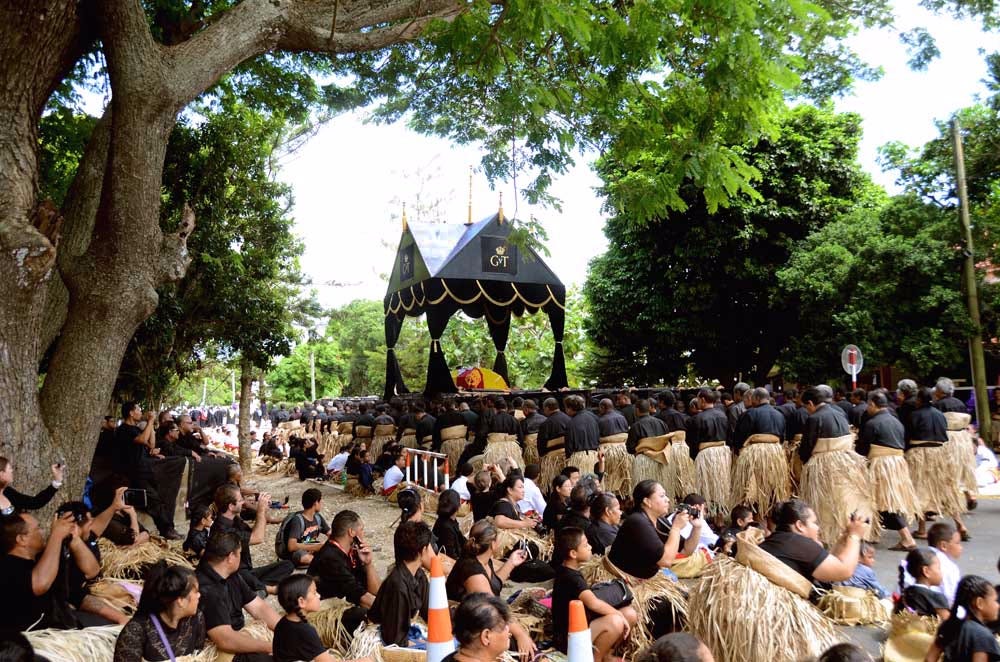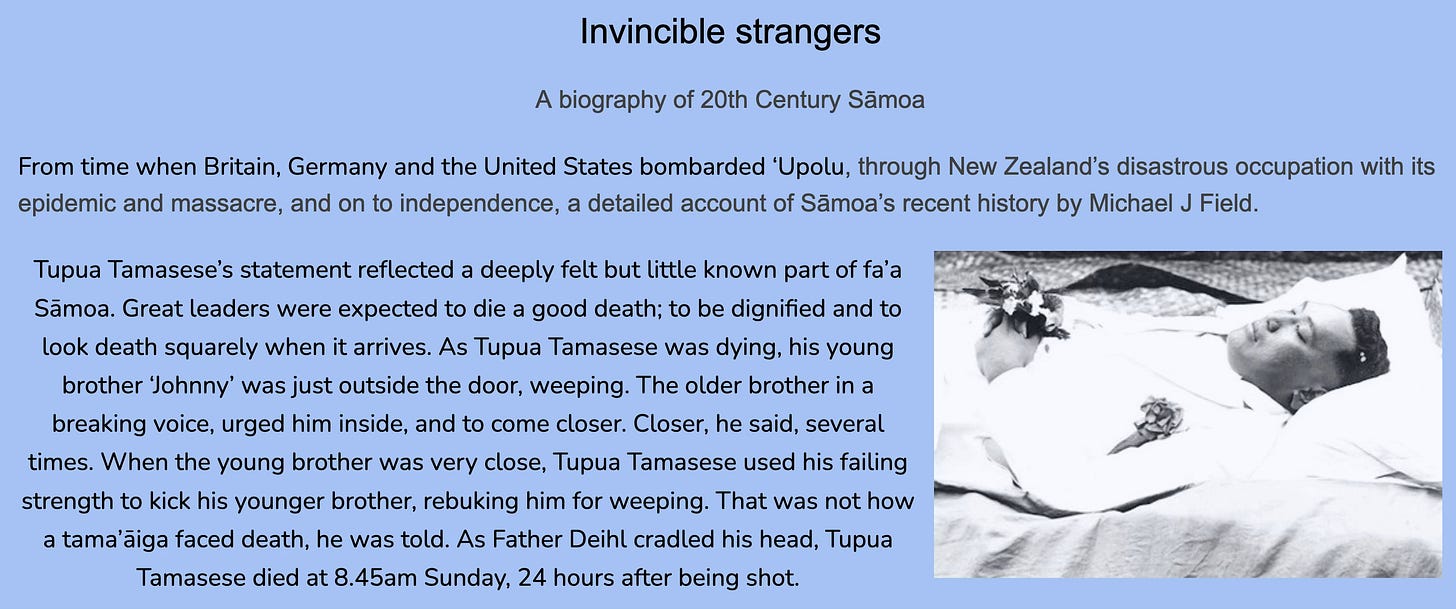Introduction
Accounts of the Kingdom of Tonga’s royal family, the Tupou, are mostly obsequious, noble savage kind of writing; look at the romantic Polynesians dressing up as European monarchs.
Barons, lords, dowagers and, coming well behind, hordes of commoners, needing to be inspired with Methodist messages. A number of writers have tackled the enormous injustices that are part of Tongan life. They are mostly in a minority, and stories of London taxis imported to drive an overweight prince around are the norm. This is an occasional series on how and why one small family has managed to loot most of the money available in Tonga, and use it to create a lifestyle completely at odds with the reality of a resource poor archipelago in the South Pacific. It is a story too on how this self-declared royal family systematically worked to crush any attempts at democracy; an action that continues to this day.
It's not an attractive story because the 178 years of Tupou rule has mostly been marked by disappointment, extortion and a constant murk that hides the truth. There is also something of a routine and continuous lie that claims, wrongly, that the Tupou line is in keeping with Tongan traditions and genealogy. It is the same kind of claim that the Battenbergs made to become Windsors. It is a story, with elements of truth to it, but only elements. Outside of Tonga, writing and journalism, such as it was, preferred a kind of fairy story tabloid approach, overlooking the quiet, almost desperate work of Tongans to bring some kind of democratic normality to the place.
My involvement with Tonga and the royals began in the 1970s. Volunteer Service Aboard were going to post me to work on the Tonga Chronicle as a reporter and trainer. For reasons I did not know, that fell through. As did a posting to the Solomon Islands, but I knew why in that case. They were heading to independence and whatever that actually meant, Chief Minister and soon to be Prime Minister Peter Kenilorea was not keen on over inspired young white chaps. I ended up with Prime Minister Tupuola Efi of Sāmoa. It was in this role I briefly ended up at Tonga’s Fua’motu airport on a new Polynesian Airlines aircraft. The Tongan dance of welcome, lakalaka, was spellbinding and for a brief moment I regretted that Tonga had not wanted me. Then, emerging from a shed beside a large spreading mango tree that in those days passed as an airport terminal, came King Tāufaʻāhau Tupou IV. He was in some kind of military uniform. In his early sixties, he did not look well. I was to see him many times over the years, and seldom saw him in good spirits. What was so striking that day at Fua’motu was that many of the Tongans there, had, as the king arrived, gone onto their knees in homage. They walked on their knees. There was a rough, somewhat similar homage to matai in Sāmoa, but not to the same scale. In Sāmoa every person can, with a dream, aspire to be a high ranked matai; in Tonga you have to be born to it. Tupou IV was often in Sāmoa, staying at Vailima, the ramshackled house built by Scottish writer Robert Stevenson. He would be out walking wearing a flak jacket, in some new drive to lose weight. Affairs of state were discussed; Tupou IV was a near absolute ruler of Tonga and whatever ideas his prime minister might have they had to be clear with the king. The prime minister was the king's youngest brother, Fatafehi Tu’ipelehake, who served in the post from 1965 to 1991, and never participated in any kind of election.
This series begins with the first king, Tāufaʻāhau George Tupou, who got the show going. He lived so long though he out ran his nominated successors and he seemed toward the end of his life to become overcome with doubt that the whole system he created might fall apart.
As he headed off to Pulotu, the paradise reserved for Polynesian monarchs, he needed not to have worried. Or at least worried there his nominee as the second Tupou would achieve the post. Problems came later, King Tāufa’āhau Tupou II, proved to be a big spending, multi-mistress rake. His best decision was to marry one Lavinia Veiongo, and she produced Sālote. Lavinia was to die two years after the birth and Sālote was raised and educated by everyone, and no one in particular. Only when she was parked at the Anglican Church Diocesan School for Girls in Auckland did she get order and care, producing a woman of style.
In 1918 the 44-year-old Tupou II contracted tuberculosis and while some hope was held for him (conditional hope, the brass band began practising a death march even as he lay inside the palace), he woke one morning, said he felt well, and collapsed dead.
Eighteen year old Queen Sālote Tupou III was next up. While she very nearly lost Tonga to a pandemic later that year, Sālote proved a steady hand and ruled for 48 years. She became a global figure and while Tonga exhibited no signs of democracy under her reign, the various scandals were particularly Tongan in cultural nature. Her failings were in her first born child Siaosi Tāufaʻāhau Tupoulahi who would later succeed his mother as King Tāufa‘āhau Tupou IV. She died of cancer in Auckland in 1965, her eldest son taking over, her youngest surviving son as the prime minister.
His coronation marked the beginning of several generations of corruption and mismanagement of Tonga. Tupou IV died, in Auckland, in 2006 and was succeeded by his foolish flop George Tupou V. He died in Hong Kong in 2012 and as he was officially childless, was succeeded by his almost vacant young brother, Tupou VI. His ambition for the job was illustrated at his brother’s funeral; instead of a hundred days of mourning, it was cut back to a couple of days.
Lurking among this gang of wastrels was Tupou IV’s daughter, Pilolevu Tuita. In competition with George V, she had seized parts of Tonga’s less than healthy commercial side, and had effectively taken the money for herself. Her brother’s desire for money, matched Pilolevu’s and ultimately led to the riotous destruction of Nuku’alofa’s central business district in 2006, and as an unexpected consequence Tonga’s nominally God-fear Christian royals end up in hock to China. The Tupou royals, who had resisted attempts at British and German rule, quietly handed over to Beijing.
During Tupou IV’s reign a democracy movement grew. Led by a former school teacher, ‘Akilisi Pohiva, it was feared by the Tupou clan, even as Pohiva and supporters stressed they were not out to end the power of the royal family. They wanted something akin to a modern European constitutional monarch. Pohiva succeeded for a time and while George V, on the throne, made the right kind of democratic noises, it was Tupou VI who with silence was quietly dealing to any democratic movement.
The Tupou royals have some pretty profound problems, not least the business of who marries into the royal family. They have been marrying among themselves, marrying cousins. The next king, Auckland born Crown Prince Tupoutoʻa ʻUlukalala is married to his double second cousin, Sinaitakala Fakafanua, who is 26th in line to the Tongan throne. The Crown Princess’s grandmother, Halaevalu ‘Ahome, and Pilolevu refused to attend the wedding. Pilolevu’s daughter Frederica Tuita, was critical, calling royal arranged marriage ‘extremely arrogant and only perpetuated the motive behind social climbers’.Pohiva was pragmatic, saying they couple were to close: ‘I do not know about biological effects of two close bloods mixed together, but I think they need new blood from outside.’
Whatever the impact of cousin marriage biologically, it has not affected their fertility; they have had four children. The eldest, now second in line to the throne, Tāufaʻāhau Manumataongo Tukuʻaho, was born on the New Zealand taxpayer at Auckland City Hospital. Some in New Zealand do very well out of the Tongan Tupou royal show.
Contents
Introduction






